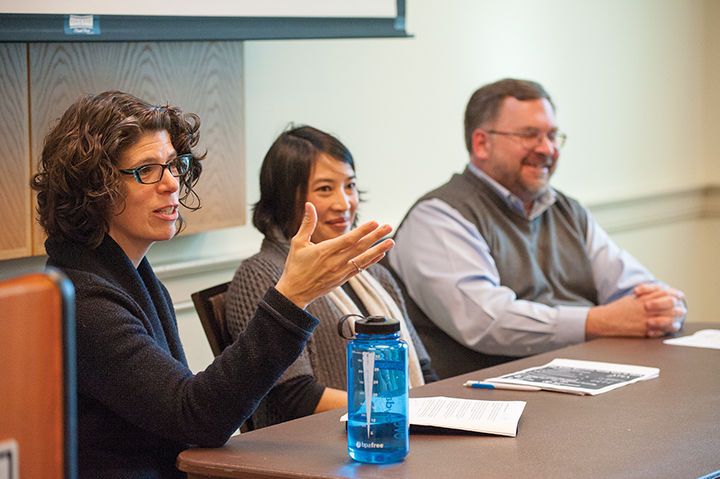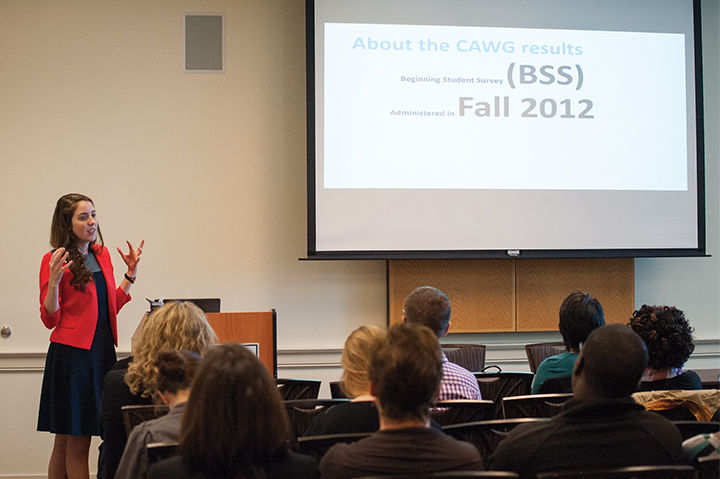Voter turnout for college-aged students has been low historically and with this year’s midterm elections four days away, experts don’t expect much to be different.
Nationally, the amount of college-aged people who vote in midterm elections is about half of those who turn out for presidential elections, according to national statistics presented by this university’s Campus Assessment Working Group.
CAWG, supported by this university’s institutional research and planning assessment office, gathers data to help faculty better serve students.
The group released a report this month derived from survey data that gathered freshman opinions in 2012 about the upcoming presidential election and their intentions to vote. The researchers found that students intend to vote far more than they actually do, said Joann Prosser, Department of Resident Life research and assessment director.
“The voting pattern for this age demographic is pretty low,” Prosser said. “I’m hoping [the data] will stimulate both faculty and practitioners’ thoughts about how to better engage students about election issues.”
The findings were the subject of a forum yesterday afternoon in Stamp Student Union. Emily Foley, the group’s research and assessment analyst, presented the data with other CAWG members prior to a discussion, connecting the campus data to national and statewide trends.
“I would suggest that college student participation in the upcoming midterm elections will probably stay true to form,” said Trevor Parry-Giles, a communication professor at this university, at the open forum. “And that means they will remain very low.”
Parry-Giles, the academic and professional affairs director at the National Communication Association, spoke on a panel at the event yesterday with two other university professors who research voting habits. He said even though younger voters today have more information available to them than ever, the numbers continue to show they don’t get out and vote as much as they report they will.
MaryPIRG’s New Voters Project — an initiative that aims to get new people to register to vote and cast a ballot — had success in registering voters this year, said junior Tom Klotz, the campaign’s campus coordinator. Members have brought in 1,271 new registered voters and expect to contact more than 4,300 people by Nov. 4 to get students to the polls.
“We recognize that by reaching out to people personally, they are far more engaged than doing it passively,” Klotz said. “Everybody should vote.”
Student interest level in different types of elections also differ, as indicated by the report, such that 38 percent of respondents said they were interested in Resident Hall Association elections, and 33 percent for SGA elections.
“The more local an election becomes, the less students report being interested in it,” Foley said.
Differing levels of elections can bring about this lack of interest in college students, simply because they may not be from the state or county that’s in question, said Dana Fisher, a sociology professor who spoke on the panel yesterday. Students also tend to look for issues they can relate to or that they feel specifically passionate about, she said.
Klotz, a government and politics major, said most of his professors have mentioned registering to vote at least once during his classes. But he said that because some people might think the process of registering is too complicated, they shy away from it.
“New voters are intimidated,” Klotz said. “They’re intimidated by what they think to be a really complex process, which is not complex and should not be complex.”
Klotz said because MaryPIRG is nonpartisan, it would be difficult to inform people about the candidates’ platforms and agendas. But with the sole focus to “just engage youth voters,” it gives them an extra push to go ahead and look further into it, he said.
“We just really want to get as many people registered to vote, and more importantly, we want them to actually vote,” Klotz said. “So we really want to contact them and follow them, and let them know about polling places and absentee ballots.”
But Skyler Golt, a junior environmental science and policy major, said because many college students are young, they might stray away from thinking about the elections and just focus on school before they vote.
“You certainly have the right to vote, so you should inform yourself,” Golt said. “But just voting to vote kind of defeats the purpose.”
Golt also said it can be hard for students to properly gather all of the candidate information they need before an election, with the content bombardment of Twitter and Facebook.
It may not be reasonable to expect college-aged voters to have a well-rounded opinion about candidates, Parry-Giles said. Just because students have the right to vote doesn’t mean they should if they lack the information to back their opinion, he said.
“From my perspective, that’s not the best reason to vote,” Parry-Giles said. “You don’t vote out of obligation — or at least, a good voter is not voting simply out of obligation. A good voter is someone that’s engaged with the vast array of meanings and messages that they’ve received from the entire political process.”
Dana Fisher, a sociology professor, gives insight on recent research findings on freshmen voting behavior at a forum held by the Campus Assessment Working Group yesterday in Stamp Student Union.
Emily Foley speaks about the research findings on freshmen voting behavior at a forum held by the Campus Assessment Working Group yesterday in Stamp Student Union.




